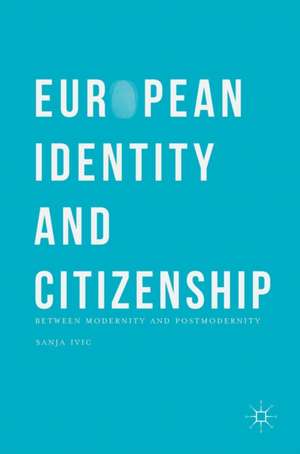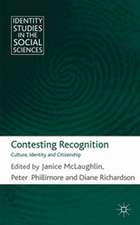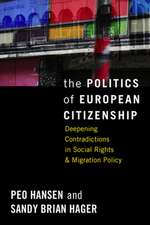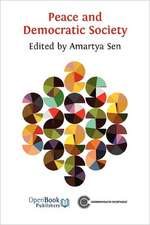European Identity and Citizenship: Between Modernity and Postmodernity
Autor Sanja Ivicen Limba Engleză Hardback – 24 iun 2016
The book offers a detailed review of political and legal studies which do not comprehend or explain postmodernist concepts of citizenship and identity. In the theoretical part of the book various philosophical models of citizenship and identity (from antiquity to the postmodern era) are portrayed, and the author's own theory and analytical framework is developed. The empirical part of the book discusses a variety of case studies illustrating how European Union policies apply to this framework.
Preț: 384.10 lei
Nou
Puncte Express: 576
Preț estimativ în valută:
73.53€ • 75.62$ • 61.00£
73.53€ • 75.62$ • 61.00£
Carte tipărită la comandă
Livrare economică 20 februarie-06 martie
Preluare comenzi: 021 569.72.76
Specificații
ISBN-13: 9781137577849
ISBN-10: 1137577843
Pagini: 266
Ilustrații: IX, 279 p.
Dimensiuni: 148 x 210 x 20 mm
Greutate: 0.48 kg
Ediția:1st ed. 2016
Editura: Palgrave Macmillan UK
Colecția Palgrave Macmillan
Locul publicării:London, United Kingdom
ISBN-10: 1137577843
Pagini: 266
Ilustrații: IX, 279 p.
Dimensiuni: 148 x 210 x 20 mm
Greutate: 0.48 kg
Ediția:1st ed. 2016
Editura: Palgrave Macmillan UK
Colecția Palgrave Macmillan
Locul publicării:London, United Kingdom
Cuprins
Introduction.- Chapter I MODERNIST AND POSTMODERNIST ACCOUNT ON IDENTITY.- Introduction.- 1. 1. Hermeneutic Approaches to Subjectivity.- 1.2. The Critique of Modernist Idea of Subjectivity: Hume and Feminist Thinkers on Identity.- 1.3. Paul Ricoeur’s Hermeneutics of Suspicion as a Critique of Modernist Concept of Identity.- 1.4. Poststructuralist and Postmodernist Concept of Identity.- Conclusion.- Chapter II PHILOSOPHICAL ROOTS OF CITIZENSHIP.- Introduction.- 2.1. Aristotle’s Conception of Citizenship: Citizenship as Active Participation.- 2.2. Modern Liberal Concept of Citizenship.- 2.3. Postmodern and Postnational Concepts of Citizenship.- 2.4. New Ethics of Citizenship: Ethics of Care.- Conclusion.- Chapter III THE CONCEPT OF EUROPEAN CITIZENSHIP.- Introduction.- 3.1. EU Citizenship: Towards the Postmodern Concept of Citizenship?.- 3.2. EU Citizenship as a Mental Construct: Mental Maps of Keeping In and Keeping Out.- 3.3. Poststructuralist Feminist Critique of European Law.- 3.4. The Concept of EU Citizenship within the European Public Discourse.- 3.5. Demographic Change in the European Union: A Challenge to EU Citizenship and European Identity.- Conclusion.- Chapter IV The European Identity<.- Introduction.- 4.1. The Concept of European Identity.- 4.2. The Four Values of the Charter of Fundamental Rights of the European Union.- 4. 3. Poststructuralist Understanding of European Identity.- 4.4. The European Identity and European Values in the Time of Crisis.- 4.5 The EU Visa Liberalization Process for Western Balkan Countries as a Reflection of the Politics of Modernity.- Conclusion.
Notă biografică
Sanja Ivic is Associate Research Fellow at the Institute of International Relations, Prague, Czech Republic, and a Research Fellow at the Institute for European Studies, Serbia. She completed her Postdoctoral research at the University of Paris 10, France. Her publications include books and articles on various subjects in the field of European studies.
Textul de pe ultima copertă
This book uses a theoretical and empirical approach to explore the philosophies of European citizenship and European identity. The author applies a focused analytical framework to argue that European identity and citizenship should be perceived as postmodern categories which are multi-layered, dynamic and fluid.
The book offers a detailed review of political and legal studies which do not comprehend or explain postmodernist concepts of citizenship and identity. In the theoretical part of the book various philosophical models of citizenship and identity (from antiquity to the postmodern era) are portrayed, and the author's own theory and analytical framework is developed. The empirical part of the book discusses a variety of case studies illustrating how European Union policies apply to this framework.
The book offers a detailed review of political and legal studies which do not comprehend or explain postmodernist concepts of citizenship and identity. In the theoretical part of the book various philosophical models of citizenship and identity (from antiquity to the postmodern era) are portrayed, and the author's own theory and analytical framework is developed. The empirical part of the book discusses a variety of case studies illustrating how European Union policies apply to this framework.













